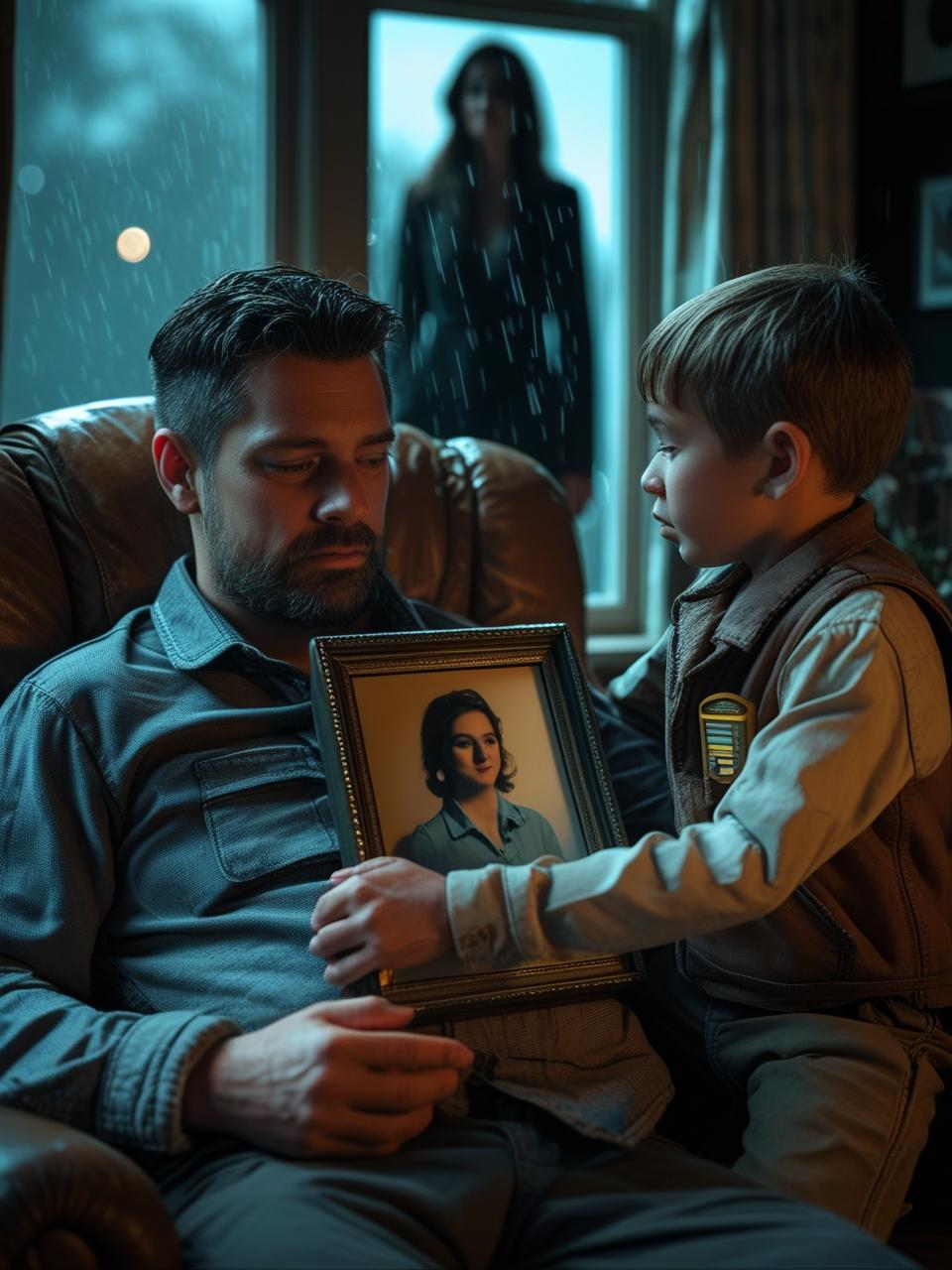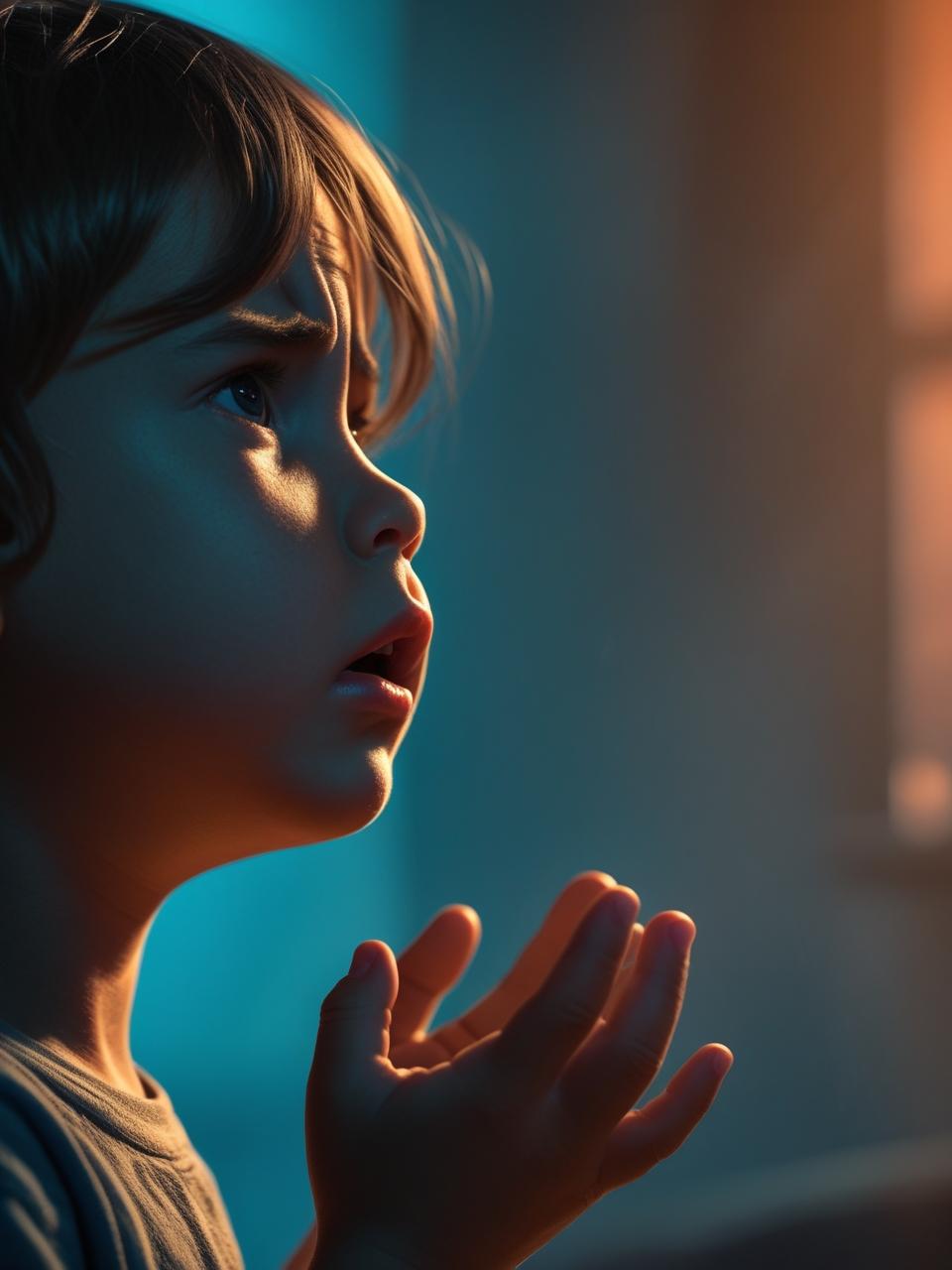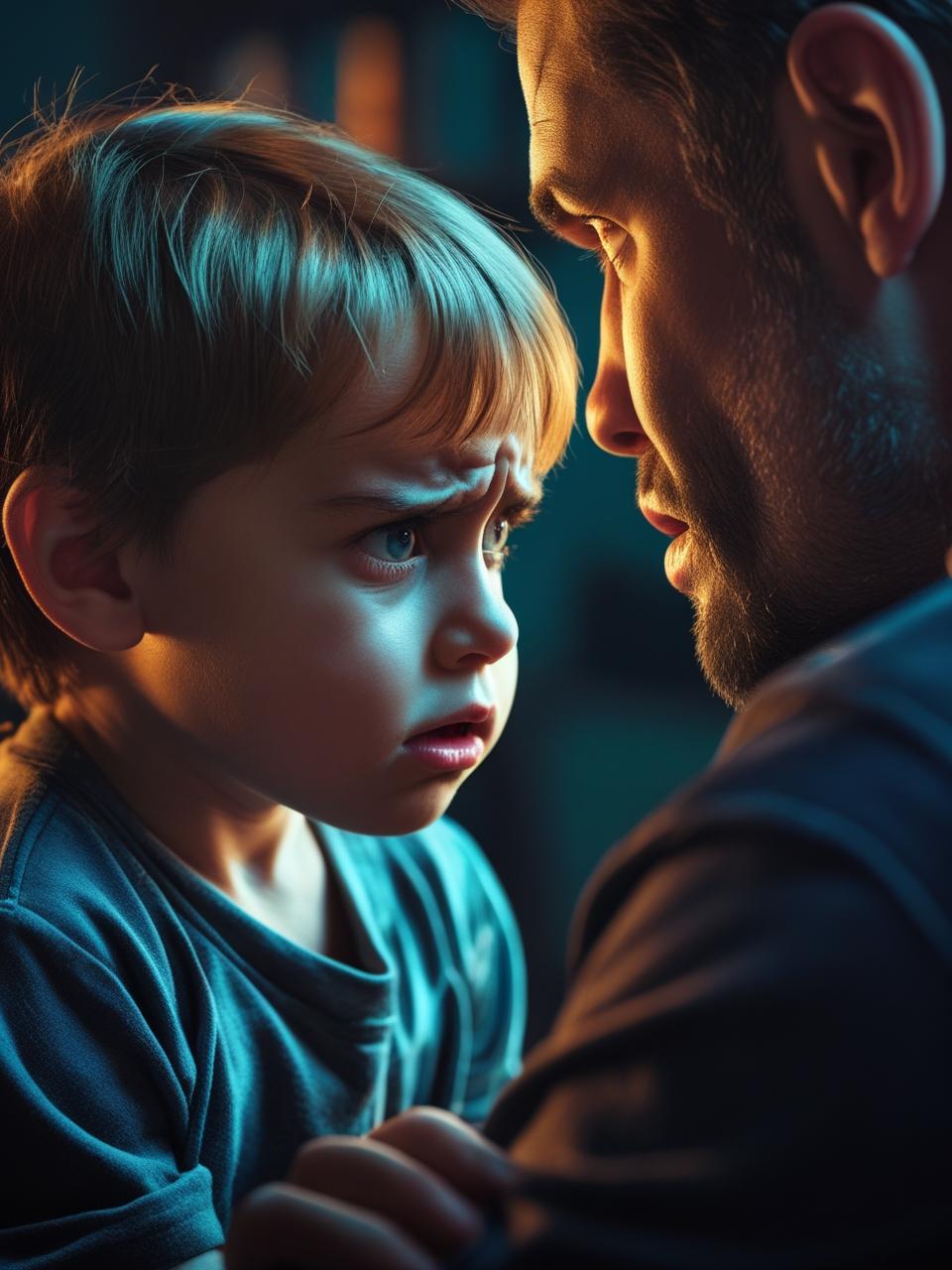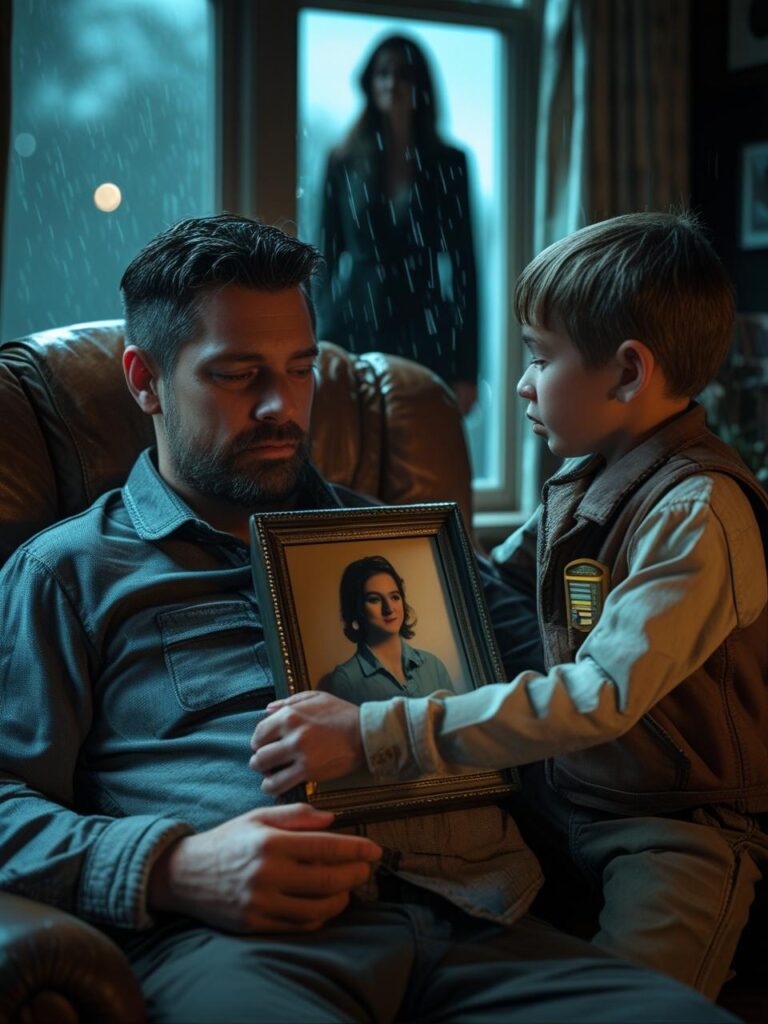I froze. The coffee mug slipped in my hand, nearly spilling its contents onto the gleaming counter.
Leo stood by the kitchen island, backpack half-open, his dinosaur-themed lunchbox clutched tight. He looked so serious.
I knelt to meet his eyes. “What did you say, buddy?”
He blinked, calm as ever. “I saw Mom. At school. She was wearing a red scarf. She told me not to tell anyone, but… she said she’d come back for me.”
My throat tightened, a cold dread creeping into my chest. “Leo… you know Mommy’s in heaven, right?”
He nodded slowly. “But I really saw her. She looked just like the photo.” He pointed toward the mantlepiece, to the framed picture of Clara, her radiant smile frozen in time.
“Can people come back from heaven?” he asked softly, his voice laced with a child’s innocent hope.
I pulled him close, my voice shaking. “No, sweetheart. Sometimes when we miss someone deeply, our minds play tricks on us. We see them, or we hear their voice. It’s okay. It means you love her very much.”
But even as I spoke the words, something inside me twisted. Leo wasn’t the type to invent stories. He never lied, not even when it would’ve been easy. He was logical, grounded, often startlingly perceptive for a seven-year-old.

That night, after putting him to bed, I sat alone in the living room. The house was too quiet. I stared at Clara’s photo. She had been gone for three years now—lost in a devastating fire that consumed her research lab.
The lab had been a federal facility, highly secured. The fire, declared an accident, left no survivors, only ashes and a single, charred identity tag, confirmed by DNA as Clara’s. The funeral had been a solemn affair, her coffin closed. I never saw her body. Just a report and a box of her salvaged belongings.
I rose and walked to my study. Inside: the old, dusty folder I hadn’t touched in over a year.
Clara Jensen – Case #519-FLab fire images. Her ID. Melted personal effects.No full body remains. Just a DNA fragment linked to a charred bone chip.
My stomach sank. What if that fragment hadn’t been hers? What if the fire was a cover-up?
The Glimmer of a Ghost
The next morning, I called off work. Drove Leo to school myself, clinging to his every word about what Mom had said. I parked across the street and waited, my heart a frantic drum against my ribs.
At 10:15 a.m., I saw her.
A woman in a long crimson coat. Platinum blonde hair pulled back. She walked near the back fields, where Leo’s class often had outdoor lessons. I only caught her profile for a second, a fleeting glimpse as she turned her head, but that second was enough to send ice through my veins.
Clara.
I leapt out of the car, heart hammering, and raced across the street, dodging morning traffic. But by the time I reached the school fence—she was gone.
I spent hours circling the school grounds like a madman, looking through every window, walking the halls. Finally, I cornered the headmistress, Ms. Albright. She shook her head—no new staff, no substitutes, no unscheduled visitors. She gave me a sympathetic, worried look.
When I picked Leo up early, I asked him where he’d seen her. He held my hand and led me to a small, hidden botanical garden behind the school, a place Clara used to visit often with him.
“She was right here,” he whispered. “By that orchid display. She smiled and said she missed me. And that she was hiding.”
I crouched down. “Did she say anything else?”
He looked up at me, serious as an old man. “She said… she said not to trust Dr. Aris Thorne.”
I felt a jolt that shook me to my core. Dr. Aris Thorne. Clara’s former research partner, a brilliant but ruthless geneticist. He had been the one to confirm her death, to eulogize her at the funeral. He now headed the very research project Clara had been working on—a project deemed highly classified by the government.

The Web of Lies and a Deeper Game
I spent weeks digging. I revisited the lab’s official report, now seeing inconsistencies. I discretely contacted former colleagues of Clara and Thorne. The pieces began to align into a terrifying mosaic.
Clara hadn’t died in the fire. She had faked her death. And it wasn’t just to escape.
The Twist: Clara had discovered that Dr. Thorne was using their classified genetic research, initially intended for curing rare diseases, for unethical purposes—specifically, to develop a designer pathogen. This pathogen wasn’t for bioterrorism; it was designed to target and selectively cure individuals based on a specific genetic marker, creating a forced dependency on Thorne’s pharmaceutical company for treatment. It was a scheme for unparalleled control and profit. When Clara tried to expose him, Thorne set the lab on fire to silence her, framing her “death” and stealing her research. But Clara, brilliant and resourceful, anticipated his move. She engineered her own escape, leaving behind a DNA fragment from a compromised sample she knew Thorne would find, to confirm her “death.”
Her appearance at the school wasn’t a memory, or a spontaneous risk. It was a calculated, desperate attempt to reach me, using Leo as an untraceable messenger. She was hiding, biding her time, gathering irrefutable proof against Thorne, knowing he was too powerful to confront directly without overwhelming evidence. And her warning about “not going home with you anymore” was literal: she knew Thorne was watching me, and wanted Leo out of the house, out of danger, signaling that she would soon make a move.
The “Mr. Ellis” in Liam’s original story would be replaced by “Dr. Thorne” here, making the connection direct.
The Calculated Reveal and a New Future
I realized Clara wasn’t just a victim; she was a ghost fighting for justice. I found the secret drop box she’d indicated in a cryptic note left inside Leo’s favorite book. It contained encrypted data: proofs of Thorne’s unethical research, his communication with shadowy figures, the full scope of his monstrous plan.
But before I could act, Clara revealed herself to me. Not in person, but through a dead drop, leaving a burner phone with a single message: “The clock is ticking. Thorne is accelerating his plan. Meet me at the old observatory, alone.”

The meeting was tense, emotional. She was gaunt, haunted, but her eyes blazed with a fierce determination. We spent days in secret, piecing together the final components of her evidence. We brought it to a trusted, incorruptible investigative journalist, an old friend of Clara’s from her university days, who had connections high up in ethical watchdogs.
The expose was devastating. Dr. Aris Thorne’s empire crumbled overnight. He was arrested, his research seized, his dark plans brought to light.
The New Ending: Clara didn’t simply return to our old life. The trauma, the years of living in the shadows, had changed her. She couldn’t go back to being just a researcher, just a wife. Instead, she chose a new path.
She founded “The Sentinel Project,” a clandestine but legal organization dedicated to uncovering and neutralizing unethical scientific research and biothreats. Her skills, her knowledge of the shadows, and her network of disillusioned scientists and whistleblowers made her uniquely suited for it.
I became her primary contact, her “ground support,” managing the logistics and security for her operations, a quiet partner in a new, dangerous mission. Our relationship transformed from a conventional marriage into a deep, unspoken bond of shared purpose, a trust forged in fire and deception.
Leo understood, implicitly, that his “Mom” was a superhero, fighting battles in the shadows. He didn’t live with us in a conventional home; instead, we fostered a small, tight-knit community of other children whose parents were involved in similar high-stakes, off-the-grid work—a safe haven, a learning environment where they understood the world’s complexities and the sacrifices needed to protect it.
Clara still visited Leo at school, sometimes in disguise, sometimes openly after Thorne was jailed. But now, when she told him not to go home with me, it wasn’t a warning of danger, but a playful instruction for their next secret mission, a game of hide-and-seek with a purpose.
Our life was unconventional, perilous even, but it was real. It was built on truth, on a love that transcended conventional boundaries, and on a shared mission to protect others from the very darkness that had almost consumed us. We were no longer just a family; we were guardians, fighting for a future where no child had to tell their parent they saw a ghost.
What hidden truths might you uncover when you dare to question what you see?
Beta feature
Beta feature


